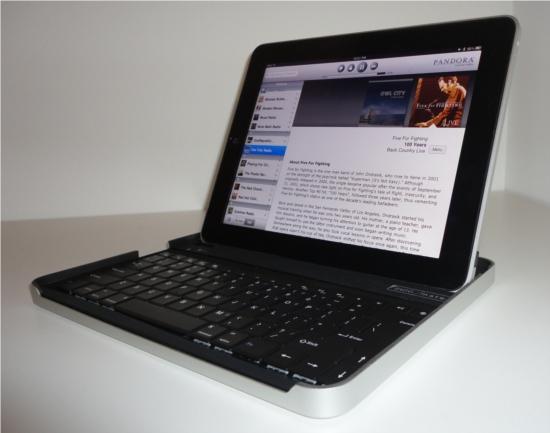
With tablets storming the shelves this holiday season and into the new year, accessories like the ZAGGmate are bound to appear more and more abundantly. The question is, do they defeat the purpose of having a tablet? It's obvious that tablets are popular and why they're popular. They are extremely portable in comparison to a computer and their performance in media consumption is unmatched.
For man, the problem with tablets is the lack of a physical keyboard. The Kindle's form would be a genius design for a tablet, and I'm unsure why no manufacturer has jumped on that form factor. I know there is a rumored 5- or 7-inch Acer tablet coming that I believe has that form factor, but it's still just hearsay. Pairing a tablet with a Bluetooth keyboard is a great alternative, but it really takes from the portability of the device. Rather than carrying a single, easy to manage device, you're carrying two devices. That's fine for many people. Throw the roll-up Bluetooth keyboard in the briefcase and only use it when needed, not all of the time. But there are some people out that after trying the iPad with a physical keyboard will not want to go back (guilty).
I've always said that all-touchscreen devices just aren't as functional as I'd like them to be. Software keyboards are just plain annoying. They aren't as accurate as physical keyboards and require a lot more attention when typing; yes, even Swype. With a tactile keyboard, I can type without ever having to look; I know where my fingers are and can feel where the keys are. Software keyboards force the user to look when they start typing and most will end up looking to make sure everything is spelled correctly. The best experience typing with a software keyboard and touchscreen I've had to date is using the Galaxy Tab with Swype. Even the iPad isn't as painful as some devices, but nothing beats a solid, well designed, physical keyboard.
The second issue with a larger tablet is how to hold it when typing. If you don't have a stand, you either have to lay it down flat and type on it or you have to hold it and type at the same time. Both of these methods are doable, but get very old over time. If you purchase a case that stands the tablet up, problem solved. But by having to prop the device up and the unfold/connect the keyboard, you have essentially a portable desk on the go. Again, that's great for some, but I know personally that I don't want to have to fumble around a lot to set everything up. This is where cases like the ZAGGmate are more useful, and in almost every way, a better idea. Without adding any additional bulk to the device (most people are going to use cases in the first place), you're adding a stand and a physical keyboard. Setting up the ZAGGmate takes about 5-10 seconds, and taking it down is even faster. If you want, you can just leave the Bluetooth keyboard on, thanks to its incredible battery life. To wake the keyboard up, you just press a button and wait a second or two.
Without adding any extra bulk, reducing the need for any additional setup, and including all three accessories in one, said accessories take nothing away the portability, and add heaps of functionality to your tablet. The iPad with the ZAGGmate is still smaller and lighter than a netbook; has comparable, if not better, battery life; and handles some things even better than a full OS could. There is still a place for tablets in this world, and there will continue to be, we're just digressing back to an older form factor, making a new breed of their own. Instead of tablet computers (touchscreen laptops with swiveling, detachable displays), we now have tablet netbooks. Whether your style is a leather flip-book design or the aircraft aluminum cover, these cases to not contradict you having a tablet, and may make you fall even more in love with your so-called useless device.
- Log in to post comments

